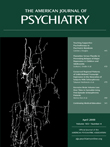Fluoxetine Versus Placebo in Preventing Relapse of Major Depression in Children and Adolescents
Abstract
Objective: The authors compared fluoxetine and placebo in continuation treatment to prevent relapse of major depressive disorder in children and adolescents. Method: After a detailed evaluation, children and adolescents 7–18 years of age with major depressive disorder were treated openly with fluoxetine. Those who had an adequate response after 12 weeks, as indicated by a Clinical Global Impression improvement score of 1 or 2 and a decrease of at least 50% in Children’s Depression Rating Scale—Revised score, were randomly assigned to receive fluoxetine or placebo for an additional 6 months. The primary outcome measures were relapse and time to relapse. Relapse was defined as either a score of 40 or higher on the Children’s Depression Rating Scale with a history of 2 weeks of clinical deterioration, or clinical deterioration as judged by the clinician. Additional analyses were conducted with relapse defined only as a score of 40 or higher on the Children’s Depression Rating Scale. Results: Of 168 participants enrolled in acute fluoxetine treatment, 102 were randomly assigned to continuation treatment with fluoxetine (N=50) or placebo (N=52). Of these, 21 participants (42.0%) in the fluoxetine group relapsed, compared with 36 (69.2%) in the placebo group, a significant difference. Similarly, under the stricter definition of relapse, fewer participants in the fluoxetine group relapsed (N=11; 22.0%) than in the placebo group (N=25; 48.1%). Time to relapse was significantly shorter in the placebo group. Conclusions: Continuation treatment with fluoxetine was superior to placebo in preventing relapse and in increasing time to relapse in children and adolescents with major depression.



